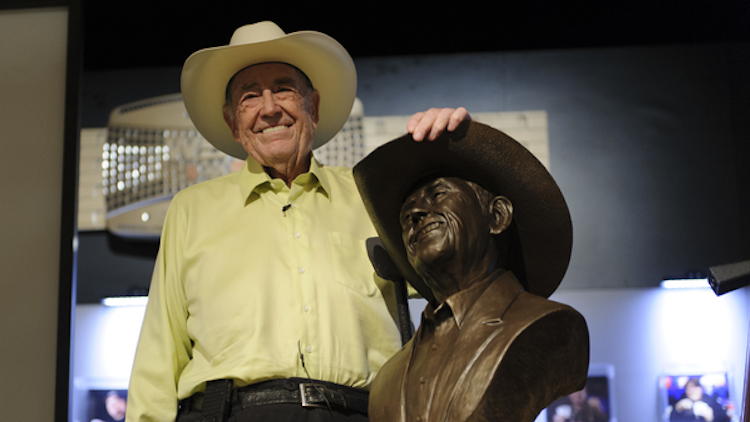Doyle Brunson, the godfather of poker, died this week aged 89. This article, written by Martin Harris, was originally published in in March 2020. It goes through some of the advice Doyle had for poker players in his classic book “Super System” and how that same advice remains relevant to players more than 40 years later.
Last week I noticed some back-and-forthing over poker Twitter regarding Doyle Brunson‘s classic compendium of poker strategy, Super/System.
Originally published in 1978 with the title “How I Won Over $1,000,000 Playing Poker” and sold for $100 a copy, the 600-plus page book covers several poker variants and features contributions from Bobby Baldwin, Mike Caro, Joey Hawthorne, David “Chip” Reese, and David Sklansky. Also included is Brunson’s own long chapter about no-limit hold’em strategy, the most significant and detailed discussion of what was then a relatively new and increasingly popular variant.
Super/System was ahead of its time in multiple ways, and its significance in the context of the history of poker strategy books is unquestioned. I make this very point in my chapter “Poker on the Bookshelf” in Poker & Pop Culture. In fact, any reasonable ranking of the most important poker strategy books ever written should necessarily have Brunson’s book at the top or very close to it.
Since poker strategy is constantly evolving, it is an inescapable fact that any poker strategy book or article might read much differently a year or two or ten or forty years later. In truth, Brunson’s recommendation in Super/System of an aggressive approach to NLHE he called “power poker” was pioneering, and is still useful decades later.
That Twitter discussion reminded me how during one of my visits to the Center for Gaming Research at the University of Nevada Las Vegas, I had gone through some old press materials produced by the World Series of Poker during the 1970s. Included were lots of player profiles and features, as well as other interesting content like trivia quizzes, lists of stats and facts, and player interviews.
For the 1978 WSOP, Brunson was returning as the two-time reigning Main Event champion, and that year the WSOP produced a profile and interview with “Tex Dolly” to share with the press. With his book just coming out, it is fitting that the article concludes with Brunson providing a list introduced as “10 surefire tips on gaining ‘luck’ at cards.”
Take a look at his tips below and see how much of what Brunson advises still holds true today.
1. Play for position: If you’re the first bettor, you need a stronger hand than if you’re the last.
2. Develop an analytical mind. Study the people with whom you’re playing. Even if you’re not in the pot, watch every hand, and try to guess what it is.
3. Exercise self-discipline. Know when you’ve been beaten and quit. The difference between a strong and weak player is that the strong one doesn’t send bad money after good.
The power of position, the value of paying attention, and the importance of self-discipline — timeless tips, all.
4. Wise money management also means if you’re winning, press your luck.
Here the advice to “press your luck” when winning might strike us as something we don’t hear as often today, particular when combined with the topic of bankroll management. The significance of luck in poker comes up several times in Super/System, with Brunson even entertaining topics like E.S.P. and superstition without entirely dismissing them as irrelevant.
All that might seem a bit distant when compared to today’s strategy talk. Then again, the tip seems also to be pointing out how having a bigger bankroll can allow for more shot-taking, which is more about understanding math than relying on luck.
5. Be mathematically acquainted with the odds of the game.
Even a basic understanding of “poker math” can still give you an edge over most.
6. Stick to basic poker. Don’t get involved in wild card games.
Forty-plus years ago (and before), wild cards were much more prevalent — not just in home games, but in the casino, too. There were even WSOP events with wild cards as late as 1983 (at least). This might be a tip most don’t need to heed today, then, although you can see how adding wild cards often can lessen the edge more skilled players possess.
7. Amateur players should minimize bluffing, which is a highly cultivated skill to be employed at the least obvious time — when you know the other player doesn’t have a hand.
8. Poker requires complete concentration. Don’t play when you’re tired or preoccupied with personal problems.
The specific tip for new players to avoid bluffing still applies, as does the advice to remain focused (and to be aware of those times when you are not).
9. Only play games with which you are well acquainted.
Here Brunson draws on his experience playing a variety of underground games while “fading the white line,” some of which weren’t always on the up-and-up. Being wary of cheaters is certainly still a tip worth heeding, even if the likelihood of encountering them has lessened.
10. Patience is not just a virtue, but a necessity in poker.
Don’t try to win every pot! Let go of those rags now and then. Or often, even!
Out of 10 tips, then, most still apply without much qualification — of value for those sitting at poker tables at Binion’s Horseshoe in the spring of 1978 and those readying for any big event on PokerStars.
Back to Top








